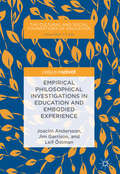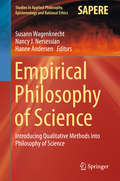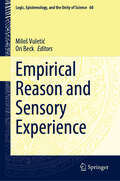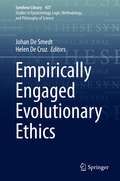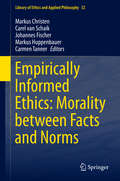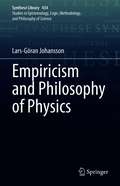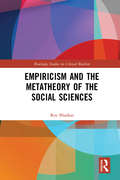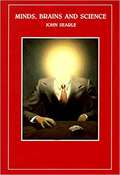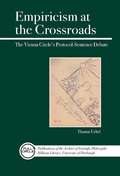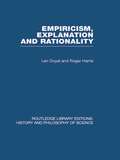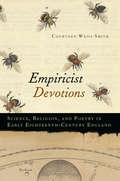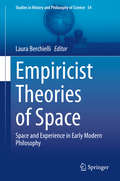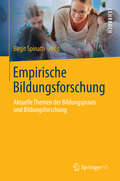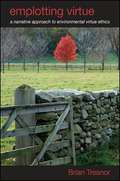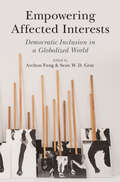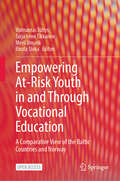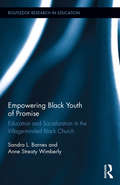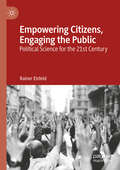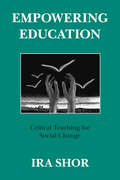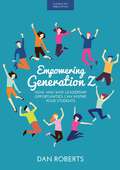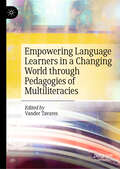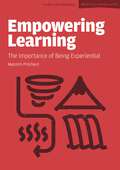- Table View
- List View
Empirical Philosophical Investigations in Education and Embodied Experience (The\cultural And Social Foundations Of Education Ser.)
by Jim Garrison Joacim Andersson Leif ÖstmanDrawing on John Dewey and the later Ludwig Wittgenstein, this book employs philosophy as a conceptual resource to develop new methodological and analytical tools for conducting in situ empirical investigations. Chapter one explores the philosophies of Wittgenstein and Dewey. Chapter two exposits Deweyan ideas of embodiment, the primacy of the aesthetic encounter, and aesthetically expressive meaning underdeveloped in Wittgenstein. Chapter three introduces the method of practical epistemological analysis (PEA) and a model of situated epistemic relations (SER) to investigate the learning of body techniques in dinghy sailing. The concluding chapter introduces a model of situated artistic relations (SAR) to investigate the learning of artistic techniques of self-expression in the Swedish sloyd classroom.
Empirical Philosophy of Science
by Nancy J. Nersessian Susann Wagenknecht Hanne AndersenThe book examines the emerging approach of using qualitative methods, such as interviews and field observations, in the philosophy of science. Qualitative methods are gaining popularity among philosophers of science as more and more scholars are resorting to empirical work in their study of scientific practices. At the same time, the results produced through empirical work are quite different from those gained through the kind of introspective conceptual analysis more typical of philosophy. This volume explores the benefits and challenges of an empirical philosophy of science and addresses questions such as: What do philosophers gain from empirical work? How can empirical research help to develop philosophical concepts? How do we integrate philosophical frameworks and empirical research? What constraints do we accept when choosing an empirical approach? What constraints does a pronounced theoretical focus impose on empirical work? Nine experts discuss their thoughts and empirical results in the chapters of this book with the aim of providing readers with an answer to these questions.
Empirical Reason and Sensory Experience (Logic, Epistemology, and the Unity of Science #60)
by Miloš Vuletić Ori BeckThe volume offers a lively and wide-ranging debate on the major questions of perceptual epistemology, including how perceptual experiences can bestow positive epistemic standing to empirical judgments and beliefs; the relative epistemic import of veridical and non-veridical perceptual experiences; the relation between experience and knowledge; and the nature of experience in view of its epistemic linkages to discursive contents. The volume is centered around five cutting-edge essays by leading authors in these areas—Anil Gupta, Andrea Kern, Christopher Peacocke, Susanna Schellenberg and Crispin Wright—along with no less than thirty contributions scrutinizing and critically discussing the essays, prompting detailed rejoinders from the lead authors. The volume closes with an extensive debate between Annalisa Coliva, Gupta and Wright. Taken as a whole, the volume covers much ground in epistemology of perception and displays a variety of approaches and perspectives through fruitful and accessible exchanges. It will be of interest not only to researchers working in perceptual epistemology but also to students new to the subject.
Empirically Engaged Evolutionary Ethics (Synthese Library #437)
by Johan De Smedt Helen De CruzA growing body of evidence from the sciences suggests that our moral beliefs have an evolutionary basis. To explain how human morality evolved, some philosophers have called for the study of morality to be naturalized, i.e., to explain it in terms of natural causes by looking at its historical and biological origins. The present literature has focused on the link between evolution and moral realism: if our moral beliefs enhance fitness, does this mean they track moral truths? In spite of the growing empirical evidence, these discussions tend to remain high-level: the mere fact that morality has evolved is often deemed enough to decide questions in normative and meta-ethics. This volume starts from the assumption that the details about the evolution of morality do make a difference, and asks how. It presents original essays by authors from various disciplines, including philosophy, anthropology, developmental psychology, and primatology, who write in conversation with neuroscience, sociology, and cognitive psychology.
Empirically Informed Ethics: Morality between Facts and Norms
by Markus Christen Carel Van Schaik Johannes Fischer Markus Huppenbauer Carmen TannerThis volume provides an overview of the most recent developments in empirical investigations of morality and assesses their impact and importance for ethical thinking. It involves contributions of scholars both from philosophy, theology and empirical sciences with firm standings in their own disciplines, but an inclination to step across borders--in particular the one between the world of facts and the world of norms. Human morality is complex, and probably even messy--and this clean distinction becomes blurred whenever one looks more closely at the various components that enable and influence our moral actions and ethical orientations. In that way, morality may indeed be located between facts and norms--and an empirically informed ethics that is less concerned with analytical purity but immerses into this moral complexity may be an important step to make the contributions of ethics to this world more valuable and relevant.
Empiricism and Philosophy of Physics (Synthese Library #434)
by Lars-Göran JohanssonThis book presents a thoroughly empiricist account of physics. By providing an overview of the development of empiricism from Ockham to van Fraassen the book lays the foundation for its own version of empiricism. Empiricism for the author consists of three ideas: nominalism, i.e. dismissing second order quantification as unnecessary, epistemological naturalism, and viewing classification of things in natural kinds as a human habit not in need for any justification.The book offers views on the realism-antirealism debate as well as on the individuation of theories as a thoroughly neglected aspect of underdetermination. The book next discusses a broad range of topics, including the predicates body, spatial distance and time interval, the ontology of electromagnetism, propensities, the measurement problem and other philosophical issues in quantum theory. Discussions about the direction of time and about string theory make up the final part of the book.
Empiricism and Subjectivity: An Essay on Hume's Theory of Human Nature
by Gilles DeleuzeThis essential reading is the foundation for Deleuze's later work and an invaluable resource for understanding the emergence and progress of his thought from Hume to Kant and then to Nietzsche. Deleuze also offers a crucial contribution to the debate about the vanishing subject, profoundly influencing the discussion of his theory of difference.
Empiricism and the Metatheory of the Social Sciences (Routledge Studies in Critical Realism)
by Roy BhaskarA picture has indeed held modern Western philosophy captive, that of the universe as a vast machine whose iron laws are best understood as exceptionless empirical regularities which, as it were, determine the future before it happens. This fantastic conception commands the assent, not just of positivistically-minded naturalists but of all the great anti-naturalists who champion a very different view of human action as a domain of freedom ‘that somehow cheats science’. The most fundamental move in Roy Bhaskar’s system of philosophy, the germ of everything that followed, was to reconceptualise the natural world in transcendental realist terms, ‘turning Kant around using his own method’. On this account, the universe is characterized by deep structures, mechanisms and fields that generate the flux of phenomena, and is in open, creative and emergent process. This completely recasts the terms of the debate between naturalism and anti-naturalism by remedying its false grounds and shows how philosophy can be liberated from its anthropocentric/anthropomorphic prison and rendered consistent with the best insights of modern natural science. There is necessity in nature quite independent of humans, but in an open world causation is multiple and conjunctural, the actual course of the unfolding of being is highly contingent and the bases of human freedom can be understood scientifically. Written as a DPhil thesis when Bhaskar was in his mid-twenties, Empiricism and the Metatheory of the Social Sciences brilliantly launches this reconceptualisation and explores its implications for social science in the course of carrying through the metatheoretical destruction of empiricism. It will be indispensable reading for anyone interested in the development of Bhaskar’s thought, in transcendental realism, and in the critique of empiricism, more generally of the philosophical discourse of Western modernity.
Empiricism and the Philosophy of Mind
by Wilfrid SellarsThis book presents Sellars' entire philosophical system and his attack on the Myth of the Given, which raised doubts about the very idea of epistemology.
Empiricism and the Philosophy of Mind: Reading Wilfrid Sellars' Empiricism And The Philosophy Of Mind, Including The Complete Text Of Sellars' Essay (The 1984 Reith lectures #1984.)
by Wilfrid SellarsThe most important work by one of America's greatest twentieth-century philosophers, Empiricism and the Philosophy of Mind is both the epitome of Wilfrid Sellars' entire philosophical system and a key document in the history of philosophy. First published in essay form in 1956, it helped bring about a sea change in analytic philosophy. It broke the link, which had bound Russell and Ayer to Locke and Hume--the doctrine of "knowledge by acquaintance." Sellars' attack on the Myth of the Given in Empiricism and the Philosophy of Mind was a decisive move in turning analytic philosophy away from the foundationalist motives of the logical empiricists and raised doubts about the very idea of "epistemology." With an introduction by Richard Rorty to situate the work within the history of recent philosophy, and with a study guide by Robert Brandom, this publication of Empiricism and the Philosophy of Mind makes a difficult but indisputably significant figure in the development of analytic philosophy clear and comprehensible to anyone who would understand that philosophy or its history.
Empiricism at the Crossroads
by Thomas UebelRather than a monolithic movement of naïve empiricists, the Vienna Circle represented a discussion forum for what were sometimes compatible, sometimes conflicting philosophical approaches to empirical evidence. The Circle's protocol-sentence debate - here reconstructed and analyzed - provides an exceptional vantage point from which to survey the various options and choices of the participants. Author Thomas Uebel mines the diaries, letters, and notes of the group's leading philosophers to show how their ideas emerged from real-world arguments, personal relationships, and historical settings.
Empiricism, Explanation and Rationality: An Introduction to the Philosophy of the Social Sciences (Routledge Library Editions: History & Philosophy of Science)
by Len & Doyal & HarrisOriginally published in 1986. All students of social science must confront a number of important philosophical issues. This introduction to the philosophy of the social sciences provides coherent answers to questions about empiricism, explanation and rationality. It evaluates contemporary writings on the subject which can be as difficult as they are important to understand. Each chapter has an annotated bibliography to enable students to pursue the issues raised and to assess for themselves the arguments of the authors.
Empiricist Devotions: Science, Religion, and Poetry in Early Eighteenth-Century England
by Courtney Weiss SmithFeaturing a moment in late seventeenth- and early eighteenth-century England before the disciplinary divisions that we inherit today were established, Empiricist Devotions recovers a kind of empiricist thinking in which the techniques and emphases of science, religion, and literature combined and cooperated. This brand of empiricism was committed to particularized scrutiny and epistemological modesty. It was Protestant in its enabling premises and meditative practices. It earnestly affirmed that figurative language provided crucial tools for interpreting the divinely written world. Smith recovers this empiricism in Robert Boyle's analogies, Isaac Newton's metaphors, John Locke's narratives, Joseph Addison's personifications, Daniel Defoe's diction, John Gay's periphrases, and Alexander Pope's descriptive particulars. She thereby demonstrates that "literary" language played a key role in shaping and giving voice to the concerns of eighteenth-century science and religion alike. Empiricist Devotions combines intellectual history with close readings of a wide variety of texts, from sermons, devotional journals, and economic tracts to georgic poems, it-narratives, and microscopy treatises. This prizewinning book has important implications for our understanding of cultural and literary history, as scholars of the period's science have not fully appreciated figurative language's central role in empiricist thought, while scholars of its religion and literature have neglected the serious empiricist commitments motivating richly figurative devotional and poetic texts.Winner of the Walker Cowen Memorial Prize for an Outstanding Work of Scholarship in Eighteenth-Century Studies
Empiricist Theories of Space: Space and Experience in Early Modern Philosophy (Studies in History and Philosophy of Science #54)
by Laura BerchielliThis book explores the notions of space and extension of major early modern empiricist philosophers, especially Locke, Berkeley, Hume, and Condillac. While space is a central and challenging issue for early modern empiricists, literature on this topic is sparse. This collection shows the diversity and problematic unity of empiricist views of space. Despite their common attention to the content of sensorial experience and to the analytical method, empiricist theories of space vary widely both in the way of approaching the issue and in the result of their investigation. However, by recasting the questions and examining the conceptual shifts, we see the emergence of a programmatic core, common to what the authors discuss. The introductory chapter describes this variety and its common core. The other contributions provide more specific perspectives on the issue of space within the philosophical literature. This book offers a unique overview of the early modern understanding of these issues, of interest to historians of early modern philosophy, historians and philosophers of science, historians of ideas, and all readers who want to expand their knowledge of the empiricist tradition.
Empirische Bildungsforschung
by Birgit SpinathSind Jungen die neuen Bildungsverlierer? Werden die Deutschen immer dümmer? Hat PISA die Schulen besser gemacht?Entscheiden sich die Richtigen für ein Lehramtsstudium? Diese und weitere Themen sind gesellschaftlich hoch relevant. Täglich berichten Medien über Bildung - mal mehr, mal weniger fundiert. Oft wird dabei ein überpointiertes, verzerrtes Bild gezeichnet, so dass es schwer ist, sich eine eigene Meinung zu bilden. Das vorliegende Buch greift aktuelle Themen aus Bildungsforschung und Bildungspraxis auf und stellt in kurzer, übersichtlicher Form den Forschungsstand dar. Sie lernen nicht nur die Fakten, sondern auch die Personen kennen, die sich diesen Fragen in Forschung und Praxis widmen. Zu diesem Zweck wurden Interviews mit Expertinnen und Experten geführt, die in diesem Buch nachzulesen sind, aber auch als Videos angeschaut werden können. Zu Wort kommen führende Bildungsforscherinnen und -forscher aus Psychologie, Erziehungswissenschaft, Soziologie und Bildungsökonomie. Zielgruppe Das Buch kann von allen mit Gewinn gelesen werden, die sich für Bildung interessieren. Studierende verschiedener Fachrichtungen, Referendarinnen und Referendare sowie Lehrerinnen und Lehrer finden in diesem Buch viele Themen, die ihre Arbeit direkt betreffen. Die Lektüre kann auch Grundlage für eine Seminargestaltung in Fächern sein, die sich mit Bildungsforschung beschäftigen (Psychologie, Erziehungswissenschaft, Soziologie, Bildungsökonomie, Empirische Bildungsforschung etc. ). Durch den Interview-Stil ist das Buch angenehm zu lesen und daher auch als Freizeitlektüre geeignet.
Emplotting Virtue: A Narrative Approach to Environmental Virtue Ethics (SUNY series in Environmental Philosophy and Ethics)
by Brian TreanorDespite its ancient roots, virtue ethics has only recently been fully appreciated as a resource for environmental philosophy. Other approaches dominated by utilitarian and duty-based appeals for sacrifice and restraint have had little success in changing behavior, even to the extent that ecological concerns have been embraced. Our actions often do not align with our beliefs. Fundamental to virtue ethics is an acknowledgment that neither good ethical rules nor good intentions are effective absent the character required to bring them to fulfillment. Brian Treanor builds on recent work on virtue ethics in environmental philosophy, finding an important grounding in the narrative theory of philosophers like Paul Ricoeur and Richard Kearney. Character and ethical formation, Treanor argues, are intimately tied to our relationship with the narratives through which we view the human place in the natural world. By reframing environmental questions in terms of individual, social, and environmental narratives about flourishing, Emplotting Virtue offers a powerful vision of how we might remake our character so as to live more happily, more sustainably, and more virtuously in a diverse, beautiful, wondrous, and fragile world.
Empowering Affected Interests: Democratic Inclusion in a Globalized World
by Archon Fung Gray, Sean W. D.Many demands for democratic inclusion rest on a simple yet powerful idea. It's a principle of affected interests. The principle states that all those affected by a collective decision should have a say in making that decision. Yet, in today's highly globalized world, the implications of this 'All-Affected Principle' are potentially radical and far-reaching. Empowering Affected Interests brings together a distinguished group of leading democratic theorists and philosophers to debate whether and how to rewrite the rules of democracy to account for the increasing interdependence of states, markets, and peoples. It examines the grounds that justify democratic inclusion across borders of states, localities, and the private sector, on topics ranging from immigration and climate change to labor markets and philanthropy. The result is an original and important reassessment of the All-Affected Principle and its alternatives that advances our understanding of the theory and practice of democracy. This title is also available as Open Access on Cambridge Core.
Empowering At-Risk Youth in and Through Vocational Education: A Comparative View of the Baltic Countries and Norway
by Vidmantas Tūtlys Tarja Irene Tikkanen Meril Ümarik Biruta SlokaThis open access book presents insights on the resiliency strategies of at-risk vocational education and training (VET) students in the field of learning, employment and social integration, in the Baltic countries and Norway. It investigates the ways in which vocational education and training (VET) can enhance the social inclusion of young people at-risk, both in terms of combating school dropout rates, and promoting transitions between various (social) learning contexts, such as school-work transition. Book presents the findings of the analysis of available statistical data disclosing the capacities and potential of the VET systems and providers to empower vulnerable learners in the project partner countries. In the context of VET, this book examines the situations of at-risk young people as they experience, and understand themselves, in it, and explores innovative solutions to address their challenges in collaboration between themselves, their teachers, and other community actors and stakeholders. Finally, it analyses and discusses the innovative pedagogical interventions used in empowering at-risk VET students as implemented in the research project 'EmpowerVET', on the basis of the Educational Learning Lab model developed by researchers from the University of Tallinn School of Educational Sciences.
Empowering Black Youth of Promise: Education and Socialization in the Village-minded Black Church (Routledge Research in Education)
by Sandra L. Barnes Anne Streaty WimberlyInformed by the experiences of 772 Black churches, this book relies on a multidisciplinary, mixed-methodological lens to examine how today’s Black churches address the religious and non-religious educational and broader socialization needs of youth. Drawing from a cultural and ecological framework of village-mindedness, Barnes and Wimberly examine the intersected nature of place, space, and race to propel a conversation about whether and how the Black Church can become a more relevant and empowering presence for youth and the Black community.
Empowering Citizens, Engaging the Public: Political Science for the 21st Century
by Rainer EisfeldThis book is the first comprehensive study to respond to the ongoing debates on political sciences’ fragmentation, doubtful relevance, and disconnect with the larger public. It explores the implications of the argument that political science ought to become more topic-driven, more relevant and more comprehensible for "lay" audiences. Consequences would include evolving a culture of public engagement, challenging tendencies toward liars’ rule, and emphasizing the role of “large” themes in academic education and research, the latter being identified as those areas where severe democratic erosion is occurring – such as escalating income and wealth disparities pushing democracy towards plutocracy, ubiquitous change triggering insecurity and aggression, racist prejudice polarizing societies, and counter-terrorism strategies subverting civil liberties. Political science needs to address these pressing problems ahead of other issues by in-depth research and broadly accessible public narratives, including solution-orientated normative notions. This need provides the final justification for evolving a discipline where problems would take priority over methods and public relevance over sophisticated specialization.
Empowering Education: Critical Teaching for Social Change
by Ira ShorIra Shor is a pioneer in the field of critical education who for over twenty years has been experimenting with learning methods. His work creatively adapts the ideas of Brazilian educator Paulo Freire for North American classrooms. In Empowering Education Shor offers a comprehensive theory and practice for critical pedagogy. For Shor, empowering education is a student-centered, critical and democratic pedagogy for studying any subject matter and for self and social change. It takes shape as a dialogue in which teachers and students mutually investigate everyday themes, social issues, and academic knowledge. Through dialogue and problem-posing, students become active agents of their learning. This book shows how students can develop as critical thinkers, inspired learners, skilled workers, and involved citizens. Shor carefully analyzes obstacles to and resources for empowering education, suggesting ways for teachers to transform traditional approaches into critical and democratic ones. He offers many examples and applications for the elementary grades through college and adult education.
Empowering Generation Z: How And Why Leadership Opportunities Can Inspire Your Students
by Dan RobertsDan Roberts, Headteacher of Devonport High School for Boys in Plymouth, believes it is crucial to empower young people to take control of their future.By building the right culture and environment, educators can help ensure that children can truly flourish and develop into adults that wish to have a positive impact on their local, national and international communities.Crisp, captivating and authentic, the book suggests fresh and practical new ideas and opportunities both within the classroom and outside.Dan Roberts' passion for young people is unmistakable, whether speaking before a TED London audience or advising the Obama administration as part of their education technology reform 2020 plan.
Empowering Generation Z: How And Why Leadership Opportunities Can Inspire Your Students
by Dan RobertsDan Roberts, Headteacher of Devonport High School for Boys in Plymouth, believes it is crucial to empower young people to take control of their future.By building the right culture and environment, educators can help ensure that children can truly flourish and develop into adults that wish to have a positive impact on their local, national and international communities.Crisp, captivating and authentic, the book suggests fresh and practical new ideas and opportunities both within the classroom and outside.Dan Roberts' passion for young people is unmistakable, whether speaking before a TED London audience or advising the Obama administration as part of their education technology reform 2020 plan.
Empowering Language Learners in a Changing World through Pedagogies of Multiliteracies
by Vander TavaresThis book presents conceptual and empirical studies on how pedagogies of multiliteracies can empower language learners, teachers, and teacher educators in an increasingly globalized yet unequal world, with a focus on social justice in language education. The chapters offer critical and innovative pedagogical insights that contribute to re-envisioning language and literacy education in the 21st century in a number of educational contexts, including post-secondary, community, refugee, science, language, and teacher education. From a raciolinguistic critique of monoglossic education in the United States to drama-based pedagogies for refugee learners in Iceland, this book contextualizes language learner empowerment by identifying and confronting ideologies of race, gender, nationality, and language. Creative multimodal and multisensorial pedagogies are enacted through learner-designed plurilingual portfolios, infographics, picturebooks, identity texts, performance, andmuseum-based learning. This book diversifies and enriches current approaches to language education based on pedagogies of multiliteracies that cultivate learner agency, identity, and critical reflection, and it will be of interest to readers with backgrounds in second/foreign language education, TESOL/ESL, sociology of education, and applied linguistics.
Empowering Learning: The Importance Of Being Experiential (World Class Schools)
by Dr Malcolm Pritchard Malcolm PritchardExperience - it is our first teacher in life, our early warning system, and our guide to world discovery. Experience connects the inner self to the outer world. It shapes our thoughts, informs our attitudes, motivates our actions. It is the most common mode of learning for all of humanity. Yet, hidden in plain sight, experiential learning is largely taken for granted by educators and researchers. We assume that experience is largely educational. We simply 'learn by doing' - don't we? There is a world of difference between 'doing' and 'doing intelligently'. By understanding how experience acts as a mechanism to inspire and scaffold memorable learning, we stand to gain greater control over this most powerful and universal force in human development. Learning, empowered by experience, is life-changing for learners; experience, purposefully harnessed, is transformational for schools.
